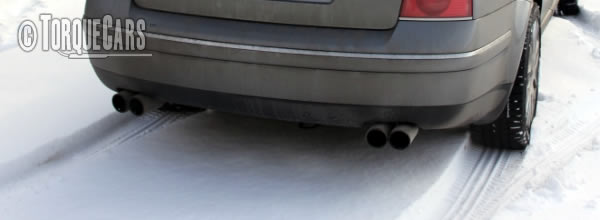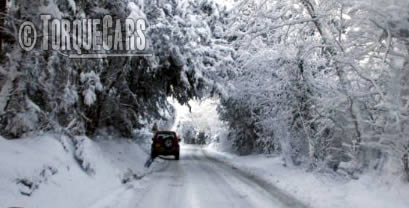Pros and cons of Winter tyres.
"It'S NOW or never."

With the poor winter driving conditions hitting the UK in 2010 many drivers are looking at winter tyres. Other countries are prepared for the snow and poor weather and are used to the concept of winter tyres.
So what are winter tyres, what do they do and are they a good idea?
Firstly we should state that winter tyres are not the same thing as snow tyres. Snow tyres are generally studded and are only really suitable when driving on thick snow and ice. Some reports have noted that studs work best on wet ice.
A studded tyre gives greatly reduced grip on a clear tarmac road and damages the road surface as well as giving poor ride quality and poor handling. Some countries stipulate an additional tax for cars using studded tyres whereas others insist that these are used during winter months when snow and ice is on the ground.
Because of the studs that winter tyres contain it makes them unsuitable for most tarmac roads unless there is a thick layer of snow and ice on the top. Most people asking for snow tyres actually really want winter tyres (which still perform very well in snow).
So what are the main differences between a standard tyre and winter tyres?
Well, winter tyres are made of a softer rubber compound, which means that even in very cold conditions where a normal tyre would be quite hard they still offer good levels of grip and retain their flexibility. (Hard rubber tyres do not grip very well, but soft rubber tyres will tend to wear out more quickly as they warm up so you really do only want to use winter tyres when it is very cold. Typically November to March in most countries.)

The tread pattern in winter tyres is noticeably different from some of tyres and it has been designed to give better grip in wet and cold conditions with much deeper tread separations to repel water and give better grip. They also typically narrower than conventional tyres which gives a greater resistance to Aqua planing and skidding.*
*Tyres are a complex subject and without going into the full discussion of physics we merely explain that in the wet and on snow, narrower tyres allow the car to put more pressure on the road (think of stiletto heels and the increased pressure over a smaller footprint) giving the car better grip.
Winter tyres still perform very well and snow when compared to a conventional tyre. In some countries such as Germany and certain states of Canada and the US it is compulsory to purchase a set of winter tyres and fit these to your vehicle during winter months.

The two options open to you are to get the tyres changed on to your rim twice a year, or to get a set of spare rims and fit the winter tyres to these.
Changing tyres can be a pain, and it has been suggested that the extra wear on the rim is not good but you will still have to find somewhere to keep the summer rubber!
A set of rims with winter tyres on still require storage when not in use but it is a straight forward DIY task to change the tyres over and you are unlikely to get caught out by a sudden change in the weather.
Although storage can be a problem because you have four tyres or wheels, or five if you count the spare, that need to be stored for six months of the year. Some people just choose to put these into the loft of their house or store them at the back of the garage. In some countries where winter tyres have become the norm there are companies offering storage for your spare set of wheels for a nominal fee, and they will collect and deliver these at your request.
Reports from TorqueCars members of their experiences with winter tyres are very favourable with many confirming that they are able to get up snow covered hills without problems, whereas similar specification cars with standard tyres are really struggling to get traction and have to give up.
For those without four wheel drive cars winter tyres seem to be the most sensible proposition to getting around when the weather gets bad.
If you are dealing with snow that arrives in short bursts then a temporary solution of snow chains or snow socks may serve better as these can be added and removed by the owner at a moments notice.
To get the best price for winter tyres you really need to buy these in order them out of season. In speaking to the tyre suppliers and tyre fitters there is a shortage of winter tyres due to the sudden adverse weather conditions in the UK and a rising demand for them.
To discuss the merits of winter tyres and other driving related topics please join our friendly international car forums.
Please Check out my YouTube channel, we're regularly adding new content...
PLEASE HELP: I NEED YOUR DONATIONS TO COVER THE COSTS OF RUNNING THIS SITE AND KEEP IT RUNNING. I do not charge you to access this website and it saves most TorqueCars readers $100's each year - but we are NON PROFIT and not even covering our costs. To keep us running PLEASE Donate here
If you liked this page please share it with your friends, drop a link to it in your favourite forum or use the bookmarking options to save it to your social media profile.
Feedback - What do You Think?
Please use our forums if you wish to ask a tuning question, and please note we do not sell parts or services, we are just an online magazine.
Help us improve, leave a suggestion or tip
Please watch this video and subscribe to my YouTube channel.

 Click to accept YouTube Cookies & Play.
Click to accept YouTube Cookies & Play.